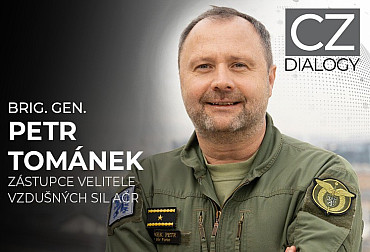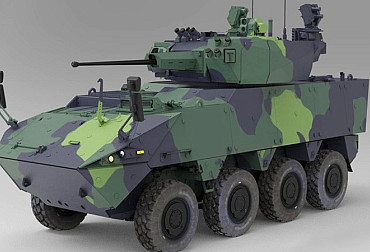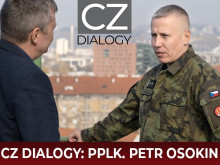Jana Černochová: I am sorry that the army is becoming part of political issues
The current security situation in Europe determines the needs of the state to ensure the defence and security of the Czech Republic. These priorities include, more than ever before, modernising the army, building new and maintaining existing capabilities, meeting our alliance commitments and other tasks. In order to meet these urgent tasks, it has been possible, among other things, to guarantee defence spending of 2% of GDP by law. However, there are still problems concerning, for example, the access of commercial banks to finance the defence industry or the setting of current Czech legislation. These are not the only issues addressed by the Minister of Defence, Jana Černochová, in our interview.
Video: Interview with Minister of Defence Jana Černochová / CZ DEFENCE
Minister, what concrete steps have been taken in removing barriers between defence industry companies and commercial banks?
During the year 2023, when the Czech Republic took over the Presidency of the European Union, we raised this issue at various levels of ministers and prime ministers. We have discussed the fact that in a period when the war conflict in Ukraine is in our immediate vicinity, the topic of taxonomy in the sense that the arms industry is treated as a dirty business is not an ideal situation. And that we as EU Member States should work to change this - it was the Czech Republic that started this topic. Then, for quite a long time, nothing much happened. Maybe other countries have come to realise a little bit that maybe they too have a problem somewhere. It was not until the end of 2023 that we discussed this topic at the European Council. We passed a fairly strong resolution at the so-called FAC (Foreign Affairs Council of the EU), which is actually a committee where defence ministers or foreign ministers go, which named the problem. As a result, we had a meeting with our banking association. We discussed the fact that the conditions of the banks should be harmonised, because it was the entrepreneurs, especially small and medium-sized enterprises, who complained about the differentiated conditions of banks abroad and in the Czech Republic. I also mentioned this in various bilateral meetings with my counterparts. Now the situation is such that we are monitoring the situation and we will receive feedback from representatives of the Chamber of Commerce and the AOBP at the end of June. It was their initiative and the results of their survey that brought us to the table precisely to negotiate with the banking association, because we wanted to address this problem. So at the moment it looks like the problem is solved. And I want to know from the companies that they too have felt the change.
In your opinion, will further legislative amendments be needed to change the current conditions for financing the activities of representatives of the Czech defence industry?
This cannot be predicted yet. We are trying to address this issue not only at home but also at the European level. I have already met several times with representatives of the Czech defence industry and the Czech Banking Association to discuss facilitating financing. At the last meeting in April, we all again exchanged our views on the situation with regard to the financing of the development of the defence industry by the banking sector, evaluated the joint work of experts and agreed that the Ministry of Defence would designate persons who would be available to bankers dealing with applications from Czech companies for financing of production linked to the strategic needs of the state. Our designated personnel immediately contacted the banks upon notification and are actively communicating with them. Some defence industry companies have already told us that their communication with banks has improved in recent days. We will, of course, continue to monitor the situation and will therefore be in contact with both the defence industry and the banking sector.
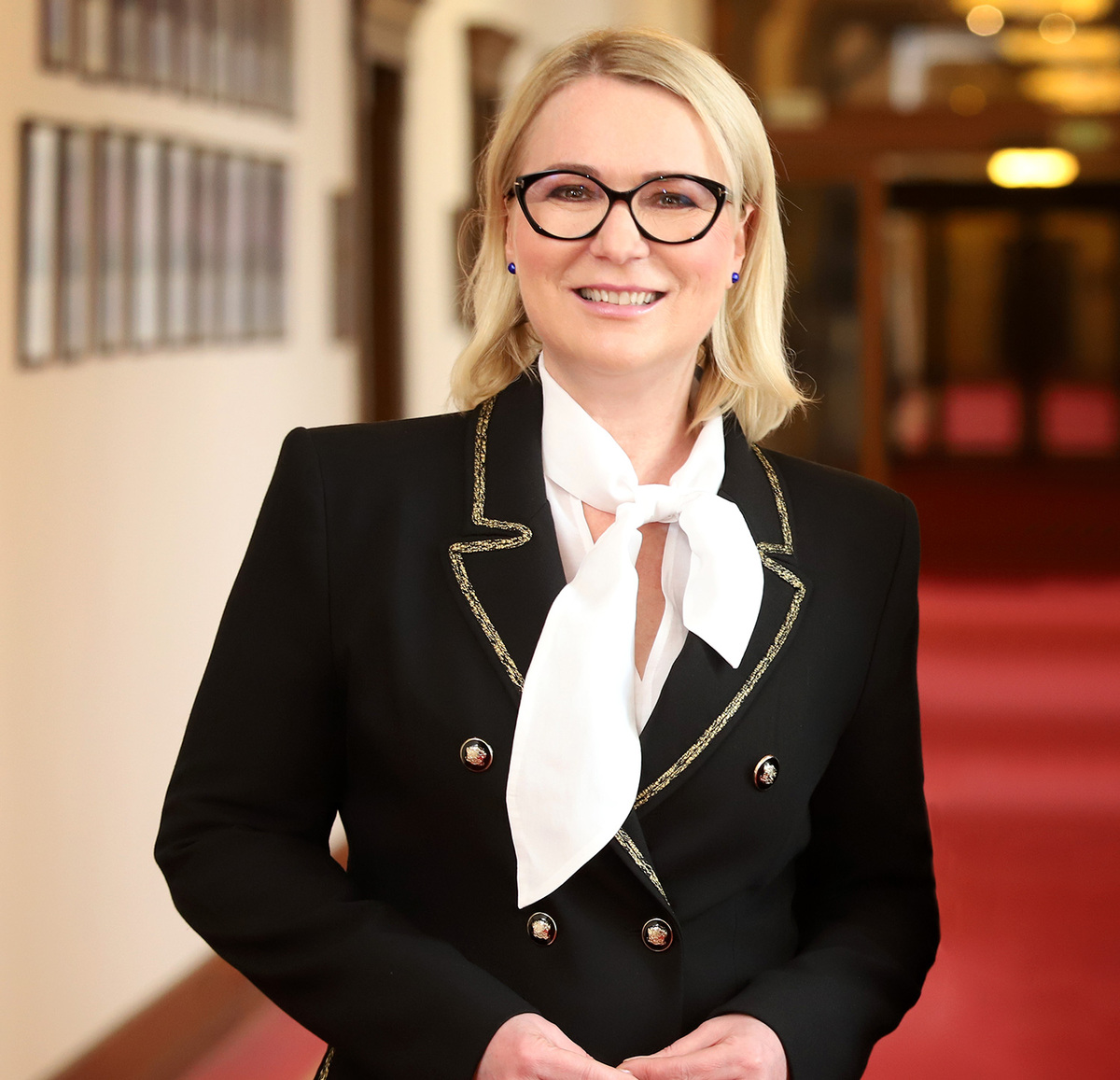
Is it possible to perceive that despite the suffering that the war conflict brings, in a way defence or arms production is an opportunity for the Czech Republic?
I'm sure it is. On the one hand, the Czech Republic is an aiding country to Ukraine and I am glad for that and I have been behind that decision since the very beginning of the war conflict. That is why the Czech Republic has been helping from the first day of the conflict, and if we are helping, we are, of course, rewarded for it by our allies, who have provided us with compensation in the form of military equipment or financial resources. At the same time, it is also a benefit for the arms industry. It is a huge opportunity for them, and we would be against ourselves if we did not take advantage of that opportunity. We also see it as an opportunity for our economy, because if the arms industry works well in our country, if it employs people here, if it pays taxes here, if it creates more jobs, more employment opportunities here, then it will have a multiplier positive effect on the whole economy. I think that this is a very strong argument for those who criticise us for helping Ukraine and for being the Ukrainian Government and who send other 'hits' that I hear about myself or about Prime Minister Fiala's Government. What I would like to say here is that we are trying to get as much of that money back into the economy as possible, and it has been coming back for a long time.
Perhaps it is a pity that this is not more accentuated in the public space.
You're right. I think this is exactly the line of communication that we should be taking as a government. We should be explaining to the wider public that Ukrainians are not a burden on our system, but that they also have a positive impact on some jobs that have long been understaffed in the Czech Republic. We see this in the services, we see it in our healthcare system and we see it in our education system, for example. Thanks to the fact that we have a lot of Ukrainian children and students here, because mothers with children in particular have come here, many mothers have become involved in the school system and are helping our teachers to manage language barriers with their children. And these are people who pay taxes here, who pay accommodation, who do not live here at the expense of the citizens of the Czech Republic.
Another topic that is much discussed in the media is the Czech munitions initiative. Can you describe how the process of acquiring new ammunition and, in particular, how it is paid for? Can we also indicate what companies are involved in the system?
It has been going on throughout the war. It just wasn't talked about to the extent that it is now. It is almost two years since we discussed with the Danish Minister of Defence and, in particular, with the Dutch Minister of Defence, Kajsa Ollongren, how we could increase capacity or help Ukraine to find military material. This is where our agency, Amos, came in. This agency is the intermediary between Czech companies and those particular countries. A certain Czech company will say that it knows about munitions in country X, Y. It is this type of ammunition, we are able to provide it in that quantity, in that time and in that quantity. We'll negotiate the price. This offer will appear on the so-called shopping list, which lists all the offers from all the entities that make offers to our ministry. We will offer this list to our partners, donors and countries with which we have a memorandum of understanding. These may also be countries with which we have had a defence cooperation agreement in the past. And those countries will choose what they would like to provide to Ukraine. The lists are not made randomly, it is always based on the requirements of the Ukrainian side, which says: now we need 155mm ammunition and we also need 152mm ammunition, which is former Soviet. The mediation of the details of a particular deal is already between the states concerned. The Czech Republic is not involved. It does not comment on the price. We do not want to get involved in that and we never have. It is a question of supply and demand. If the donor or the state decides to go into it under certain conditions, it is a matter for that state - its government - to decide. In order to confirm the complete transparency of the whole process, we are offering donor countries the possibility to have a person in the Ministry of Defence, of course with the appropriate security clearance, to see specifically how the process is going and to report back to their country. So that he can say that it is really transparent and there is no doubt. There are already 15 or 16 countries with which we have some form of cooperation. Apart from our munitions initiative, there are other initiatives going on from some other countries, which is absolutely fine. We are not jealous of each other and we are not competitors. On the contrary, the aim of all the initiatives is to help Ukraine win the war.
How are you doing with replenishing ammunition for the Czech Army?
I'm not gonna lie. Of course, because of the war in Ukraine today, it is not easy to procure any military material. I wouldn't limit myself to ammunition. The budgets and price estimates that we have from 2021 or from 2020 under my predecessors no longer correspond to reality. So it is not easy, but we are doing what we can. You know, we finally got two percent of GDP in our budget, which means for us that finally the military can plan. And now I mean the whole department. Not only the army, but of course the Ministry of Defence can plan the modernisation of the Czech Army. It is also true that it has some birth pains at the beginning. We are now learning how to do strategic projects in such a form that they can be discussed, for example, by the defence committee, and approved by the government. So that they are projects that will have long-term financing, because we have to plan for the long term and we have to start the whole acquisition process according to the rules and process it according to the law.
Is it possible that someone will try to reverse defence spending in the next term?
I hope not. Any government that would allow such a thing would be against itself. Two percent is a floor for us, not a ceiling. And I think that's how anyone who ever sits at the head of the Department of Defense or the government of the country should approach it. Security is not free. Out of the twenty-five years that we have been part of collective defence and the North Atlantic Alliance, we have fulfilled it in virtually only one year, which is shameful.
Let's turn to the domestic defence industry. Is it possible to support it in a more significant way at the expense of foreign producers or is it impossible within the Alliance? Are the rules of competition clearly defined?
When you look at some of the larger countries in Europe that also have a developed arms industry, you think, if the rules of European competition are the same everywhere, then it is strange that some countries really prefer their arms industry and I don't feel that they are completely opening up the European market to other countries. I do not blame them. I think it is absolutely right that every country wants to have a certain degree of self-sufficiency in its own territory, just in case of various crises, when you will then find it difficult to get parts or gunpowder or other things around the world, or you will get them at a terrible cost. I think that the approach of countries that are trying to secure their defence industry on their territory is quite right. I would like it to be the same here. For example, in 2023 we had almost 13,000 contracts in the Ministry of Defence. These were contracts of all different types, and of these, over 12 000 were with Czech entities. Even on this evidence you can see that we are really trying to support Czech industry. On the other hand, years ago, when there was a demand for various countries to participate in the development of the F-35 aircraft, the opportunity was not taken up in the Czech Republic. We are now trying to catch up ex-post to at least involve Czech industry in the production of these aircraft. We have succeeded to a degree that I would say has exceeded everyone's expectations. I am trying to think strategically. For the future production of tanks, we have decided that together with Germany and with other countries we want to go together into the project of producing the Leopard tank version eight. Maybe some defence minister who will be sitting here with you in ten years' time will say - what a strategic decision we have made, because now there is much more Czech industry involved in this project.
At what stage is the selection of the future main battle tank for the Czech Armed Forces now? Are the negotiations with Germany on the joint acquisition of the new Leopard 2A8 tanks with other countries over? Do we have a chance to influence the percentage of industrial cooperation of Czech companies in any significant way?
In recent months, we have been in intensive negotiations with Germany for the procurement of up to 77 Leopard 2A8 tanks in six modifications with a planned delivery date of 2027-2030. We plan to conclude the contract in the third quarter of this year. However, further information on the ongoing negotiations cannot be disclosed. At the same time, we have received 15 Leopard 2A4 tanks as a gift from Germany and Berlin has decided to donate another 15 tanks of the same type. In addition, the German defence industry is offering us the possibility of buying 15 Leopard 2A4s on the same terms as the German Ministry of Defence. The Ministry of Defence has yet to decide on the possible purchase. As far as the involvement of the Czech defence industry is concerned, we always try to involve it as much as possible in acquisitions. This was the case, for example, with the acquisition of Swedish CV90 tracked combat vehicles and American F-35 aircraft. For the CV90, the involvement of the Czech defence industry will reach at least 40% of the contract value. The Swedish side has contractually committed to this. In the case of the 5th generation aircraft, industrial cooperation worth more than CZK 15 billion has been agreed with the manufacturer and is to cover 14 projects. It is not yet possible to say what the involvement will be for the new tanks. When all the negotiations are completed, we will certainly disclose them to the public.
At one of your very first press conferences as Defence Minister, you announced the Ten Commandments for Defence. What has been accomplished?
I think we've fulfilled all of the Ten Commandments. At least at the stage that something has started to be done about it. I could mention recruitment. I want to dedicate the rest of the term I have ahead of me in the Ministry of Defence to people. We can have the best and most modern equipment, but if we do not have quality people, it will be useless. And despite all our ambitions and all our efforts, we are still finding it very difficult to get to those 30 000 conscripted soldiers and 10 000 active reserve personnel. We are trying to change the legislation as little as possible. The virtual recruitment centre is already well on its way to being a successful project. You might be interested to know that specifically in the first six months, over 290,000 users visited our virtual centre. A total of 8,700 applicants have registered so far. Unsurprisingly, the greatest interest is in the service of professional soldiers. There it was 4 157 registrations. 1 500 people wanted to enlist in the active reserve. The number of registrations of those interested in studying military high school is also high, which pleased me. There were 962 registrations. A similarly high number of registrations was also recorded for studies at the Defence University, where there were 977 registrations. I would like to remove some of the obstacles that stand in the way of those people who have already made up their minds, registered through the recruitment centre, but are then, for example, waiting for a medical examination or to be able to do the basic course in Vyškov. These are all other things that we are trying to eliminate together with the Chief of the General Staff and my colleagues. These are common things that you probably come across in every company. You feel that if you made a decision a year ago, it's too bad it's still not on the table. They explain to you that they had to deal with a thousand interdepartmental comments and explain to some of their colleagues that something was breaking.
The ministerial term of office is four years. Is it possible to achieve any measurable results in the Ministry of Defence in that time?
I feel like, even though I've been here for two and a half years, I've been here for ten years. I live so intensely that I really feel that what we have experienced here could not have been done in such a short time. Anyway, I think that four years is not enough time for a self-active Secretary of Defense to see the results of his work. Because, coming back to military equipment, in 2022 we started the negotiation process for the purchase of infantry fighting vehicles. In 2023, we entered into a contract, and these are all processes that take an awfully long time, and we know that the first infantry fighting vehicle will come to the country sometime in 2026, if nothing goes wrong. That is exactly the cut-off period. A more self-active Defence Secretary will hardly see the results of his work. He would have to be here for two terms to get the job done. Acquisition processes are very long in the Czech Republic.
And then there is the legislative process and, for example, the Office for the Protection of Competition, which also enters the process of acquiring new equipment for the army. How do you estimate that will play out in the case of the CV90?
I don't presume to guess anything. We had a team in the Ministry of Defence, we had a team of lawyers, we had an external law firm, we had consultations with the Office for the Protection of Competition before we took this course of action. So it was well prepared. And the fact that we need this equipment in order to be able to say that we are modernizing the military and fulfilling our alliance commitments, that is also a fact. And I firmly believe that all of the institutions that are reviewing this contract are aware of that.
Maybe if there were changes in the legislation, everything would be easier.
That's what I thought, too. Some changes are for the better, some changes are for the worse. The legislation gives us the opportunity to go the government-to-government route, for example. We're not doing it in a new way now. All ministers have done it that way. My predecessor, Lubomír Metnar, made this decision in Andrej Babiš's government on the purchase of helicopters. I do not think that we should criticise ourselves for following the so-called government-to-government procedure, whether we are in opposition or not. It is common. Other countries in the world behave that way. And I raised my eyebrows a little bit at the time over the Supreme Audit Office (SAO) report because in other reports we were being blamed for the fact that everything was taking an awful long time. And when we opted in some cases to buy G-G, again, in another report, we were reproached for this practice. So I asked the SAO how we should proceed so that the SAO would be satisfied.
Let's go back to the 2% of GDP. You said yourself that today it is a floor, not a ceiling. There are even countries that invest three or four per cent of GDP in defence. Can you imagine such an increase in the budget? How do your government colleagues view this?
I can imagine, of course. I know how many projects we have in the pipeline and how many purchases we need to make in order to have a modernised army and to meet our commitments not only to NATO but also to ourselves. And that the equipment that will be in use by our soldiers is the best that is on the market - especially in terms of soldiers' lives. They should have equipment that will protect their lives in the future. If you asked me if I knew what to buy with the increased funds, I would say absolutely yes. On the other hand, I have my feet on the ground. The only way to convince the public that investment in defence is worthwhile is for the public to see how much money has been added to the economy through various initiatives and the involvement of the Czech arms industry, whether in terms of taxes or in terms of various job opportunities. And this is the way to show the public that on the one hand, something is being spent from the budget on our own defence, but at the same time it is bringing significant funds into the budget. It gives opportunities to industry, and the arms industry has a long tradition in our country, or if you like, in Czechoslovakia. We were a great power in the 1930s and I think that, unfortunately, the tragic background with the war in Ukraine gives our armourers a great opportunity to get back into that position. We, as the Ministry of Defence, should be helping them, because this will then have a positive impact on the whole economy.
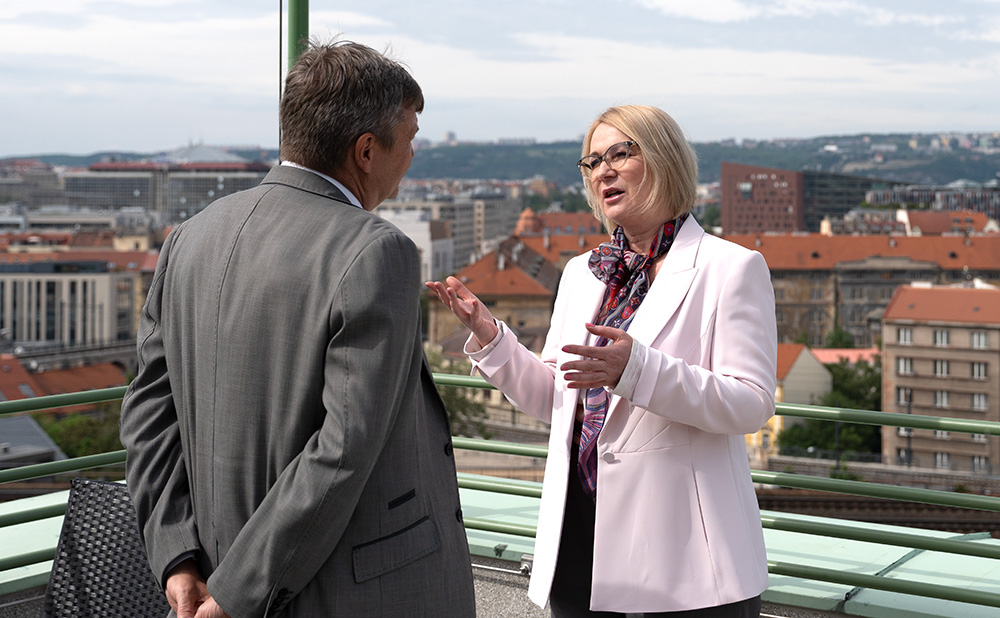
The Ministry of Defence has 5 state-owned enterprises. How do you assess their current condition and are all enterprises of strategic importance for the Ministry in the future? How do the SOEs stand in the competitive defence market? Are there any activities or capabilities within SOEs that the MoD has abandoned in the past and would now like to revive, such as Military Construction?
First of all, it must be said that the state does not own these companies for profit, but primarily to preserve skills and know-how. The SOEs are of strategic importance to the Ministry, primarily because it is necessary to have its own capabilities and capacities in case of a crisis and not to be dependent on external suppliers, for example in the field of repairing military equipment. In this respect, the war in Ukraine is a lesson for us. These capacities are essential for us, and it should be borne in mind that only when a serious crisis comes will it become clear how important they are. At the same time, however, this does not mean that these companies are not capable of establishing themselves on the market. They work with cutting-edge technology and have a number of their own contracts. They are, among other things, a major employer and help in this respect in their region. However, due to limited resources, the Ministry cannot have independent state-owned enterprises in all areas, such as the construction sector. Therefore, it has to prioritise and we are currently considering other options to strengthen some of the capacities within the existing SOE structure.
What was the significance of the meeting of NATO foreign ministers in Prague for the Czech Republic?
To hold such a summit of NATO foreign ministers at a time when war is raging in Europe shows that we are a firm ally of the democratic West. Moreover, in a year when we are celebrating 25 years in the North Atlantic Treaty Organisation. In other words, we are contributing to strengthening NATO's unity and cohesion. We are also building on 2002, when we held the Prague Summit, which 22 years ago was a significant milestone in the development of the Alliance. It helped to integrate most of the former Warsaw Pact members into the Alliance structures, thereby preventing the creation of a power vacuum in Central and Eastern Europe and contributing to the military-political stabilisation of the area.
The importance of the Czech Republic for the Alliance lies mainly in the fulfilment of the so-called HNS (Host Nation Support), i.e. the host country for the redeployment of Alliance troops. How are we currently prepared for this regime?
Given our geographical location, it is logical to assume that the Czech Republic would become a major strategic transport artery in the event of an attack by a member of the North Atlantic Alliance. In this sense, we are managing the role of a host country, as the Czech Republic regularly participates in NATO international military exercises, during which military equipment is moved across our territory. In the event of a war conflict, the volumes of troops moved would, of course, be much larger. We are aware that we still need to work on and improve some things, especially in the area of inter-ministerial access. In addition to the Ministry of Defence, other public administration and security agencies should also be involved in the HNS. This matter is also reflected in our strategic documents, in the Concept for the Construction of the Czech Armed Forces 2035 and in the Defence Strategy of the Czech Republic, which was adopted by the Government last October.
What can the Ministry of Defence and the Army of the Czech Republic do to ensure that the citizens of our republic perceive the army and its importance for the defence of the state as a priority?
I think municipal politicians can certainly play a big role in this. When, as mayor of Prague 2, I held a War Veterans' Day event on 11 November on náměstí Míru Square, people came up to me and said: 'Wow, we are seeing soldiers here for the first time, we can touch them and talk to them.' We need to overcome the barrier of society seeing the military more as something that is part of our lives and that it is also a good employer in terms of benefits and perks. And I know that those legitimate grievances of the security forces are indeed legitimate because the military has better conditions than the security forces. I'm not going to lie that it's different. Surely it should also be the politicians who should stand up for the soldiers. If someone calls them unflatteringly mercenaries, then politicians should defend them and certainly should not make the subject of defence and defence capability a political issue. I think that's probably the worst thing that could happen to us. And I am sorry that this is happening at a time when I am Defence Secretary. I was an Opposition MP for eight years and anyone can trace back what I voted for, what motions I put forward myself, that I was really a supportive element. And I'm sorry that that's not happening now, and that the defence army is becoming part of the political issues. That's wrong and it's not going to do any good. It is a subject on which there should be at least a majority consensus. But the fact that more and more harping on the army from politicians is starting to appear in the public arena, I do not like that. I think we can forgive it, because I do not feel that the army is politicised in any way. When I read a post on Twitter or on some social media, for example, from one of the soldiers that I think is over the line, I'm the one who takes it up with the Chief of General Staff and asks him to set the record straight.















